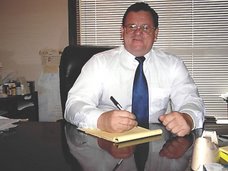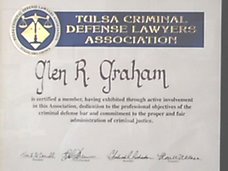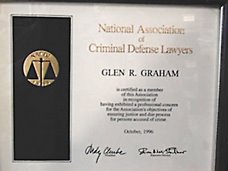Tulsa Criminal Defense Attorney, Director Best Lawyers of Oklahoma, Tulsa, Oklahoma
Phone: (918) 583-4621 or email glengraham@icu.net
Over the years, the court system in Tulsa County has evolved and adapted to changing times and circumstances. Historically, Oklahoma has had a high rate of incarceration. In 2006, Oklahoma lead the nation in the rate of incarceration for female offenders. In response to public and political pressure and budgetary issues, the Oklahoma court system has evolved and developed alternative sentencing procedures and alternative courts to handle alternatives to incarceration.
The costs of incarceration versus the costs of alternatives to incarceration are significant enough to cause people to consider alternatives to building expensive prisons. Some people began searching for alternatives to incarceration even though the prison industrial complex offers financial incentives for private prisons and financial incentives for certain depressed areas.
As technology continues to advance, other alternatives to incarceration have begun to appear and to be in use in some of the alternative court programs in Tulsa County. The DUI-Drug court routinely requires either a scram (which is worn like an ankle bracelet and continuously measures perspiration for alcohol) or a telephone sobrietor monitoring system (which is attached to the telephone and when the person breathes into the machine it sends a signal as to the results). Also, there is often a requirement that an inter-lock alcohol breath testing device be installed in any vehicle in which the participant may operate. A global position monitoring system (GPS) is also available in appropriate cases. The technological progress and advancements are continuing to provide a multitude of less expensive means of supervising people without expensive prison costs.
It is only a matter of time until someone develops mobile electronic drug testing devices. See research at http://www.criminology.fsu.edu/journal/ They could would work on the same or similar principles to the scram or telephone sobrietor and car interlock testing devices.
The Tulsa DUI court and the Tulsa Drug court, basically run along the same basic model. It is limited to felony offenses, and normally repeat offenders or offenders that may be looking at possible incarceration and the alternative court is an alternative to incarceration. It is a “treatment” approach whereby the offender if they qualify and if the prosecutor agrees, can obtain treatment under strict guidelines and close court supervision. It is a four or five stage process. Initially, the offender is required to attend 3-4 AA or NA meetings per week, random UA’s, a counseling session, and make one court appearance per week for review before the Judge. After several weeks the offender will progress to the next stage and so on. Upon completion of the program at the end of about 18 months, then the offender is placed on probation and will see a probation officer for a period of time. It is not unusual for an offender to relapse and to require inpatient treatment several times. The Drug court and DUI court is a treatment oriented program and relapse and treatment are typical. After about 18 months, if the offender is unable to complete the program, there may be a motion to terminate filed by the prosecutor seeking to incarcerate the offender for failing to comply. A hearing may be held where the court will take testimony and make a decision about whether to terminate, incarcerate, or pass sentencing one more time for the offender to complete the program. At some point, which is usually after about 18-36 months, the offender will run out of time to complete the program.
The Tulsa County mental health court for criminal offenses is a new program and one of the first in the nation and the funding is severely limited at this time, so that means there may be a limited number of openings and that some people may be turned down. There may be some people that are on the borderline or that are marginally qualified but they may be turned down because of a limited number of openings and severe funding limitations.
The Tulsa County mental health court for criminal offenses is for non-violent offenders who suffer from some kind of severe mental illness. It is modeled along the same lines as the drug-dui court. The offender must have a non-violent offense and a non-violent background to qualify. The District Attorney makes the initial determination if the offender will be considered acceptable for the “mental health court.” The offender will be subject to an initial mental health assessment by the court approved assessor. If the offender does not qualify, the court may reject the offender. If the offender qualifies, then the offender has a treatment provider and a counselor and is required to make regular court appearances.
The Tulsa Community Sentencing Court which is also called the Tulsa Accelerated Accountability Procedure Court (AAP) offers an alternative for non-violent offenders to expedite their case through the court system. The offender is typically a non-violent offender and the prosecutor will review the case to see if the offender qualifies for admission into the AAP court.
The offender will be required to complete a Level of Services Inventory (LSI) which is an assessment to determine what the needs of the offender are and what level of services may be required. If the offender qualifies in the moderate range which is a point system, then the offender may qualify to be approved for a community sentence. A community sentence is probation with a community sentencing officer as the probation officer. The community sentencing officer is supposed to help the offender find the services in the community and to supervise the offender. If the offender relapses or violates the community sentencing rules, the offender may be “sanctioned” by requiring treatment or about 10 days in jail. If the offender continues to violate the rules or has a serious rule violation such as a new offense, then the offender faces the possibility of the revocation of the probation and the possibility of being sentenced to prison. A community sentence is better than regular probation in that like it sounds is an alternative to prison and attempts to find services in the community to meet the needs of the offender instead of prison.
If the offender scores in the high point range on the Level of Service Inventory (LSI) then the offender may be placed on probation through the Department of Corrections but the offender will not be on a community sentence. The supervision by the Department of Corrections is more law enforcement oriented and less community sentencing oriented. Some would analogize it to being on probation with a law enforcement supervisor instead of a community sentencing –social-psychologist –type supervisor. A community sentence probation can be better for the offender and for society in the long run because of the attempts to achieve real change and the attempts to find help for the offender in the community. Unfortunately, for some reason, some offenders fail to take advantage of all of the services and all of the help that is offered by a community sentence. In theory, if the offender qualifies, some of the services may be subsidized and the offender would not have to pay for everything themselves (in theory).
By Glen R. Graham, Tulsa Criminal Defense Lawyer, my email glengraham@icu.net Web Page http://www.glenrgraham.com



